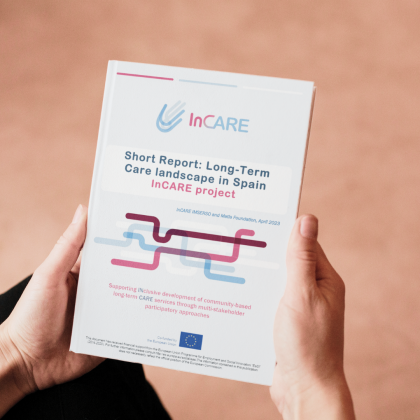- Fourteen municipalities in Gipuzkoa are benefiting from this project which is committed to the reformulation of care at a European level.
- Case management and community mapping among the key proposals (aspects) of this change in the care model.
- InCare, Imserso and Matia have signed a report that offers a brief overview of the long-term care panorama in Spain.
In Donostia - San Sebastian on 1 June 2023. The InCARE project (Supporting Inclusive development of community based long-term CARE services through multi-stakeholder participatory approaches), aims to contribute to the design of a coordinated approach to the development of national long-term care policy and care services at local and regional level, through the establishment of socially innovative and participatory decision-making processes. This international project consists of 3 pilots in Austria, North Macedonia and Spain, the latter through the collaboration between Matia and Imserso.
The overall objective of InCARE is that carers and their families receive the care they need when they need it. The InCARE project has identified the needs of the people, the agents involved and the care coordination processes themselves through two participatory Theory of Change processes to co-create solutions both at national level and in Gipuzkoa. The following people have taken part in these processes: carers (both family members and professionals), social agents, researchers, technical staff from the administration and people from the field of politics to generate planning at a national level and a pilot project in the Gipuzkoa environment.
The pilot project is being developed on the basis of the SENDIAN programme, a programme of the Provincial Council of Gipuzkoa (Department of Social Policies), aimed at carers, and a great potential to support the coordination of care from the knowledge of people and services in the local environment.
From the project and through the SENDIAN programme, several actions are proposed so that carers can manage the complexity of their situation as well as possible.
- One of the proposed actions is to support municipal social services in the development of case management. To this end, meetings have been held with the social services of some towns in Gipuzkoa, specifically, initial contact has been made with the centres in Zumaia, Azkoitia, Eibar, Orio, Azpeitia, Elgoibar, Rentería, Zarautz and Mutriku. In these meetings, the InCARE project has been presented and coordination actions have been proposed between the social workers of the centres and the professionals of SENDIAN.
- They have also proposed accompaniment practices in case management, as well as support to create community maps that collect resources and services available in the municipalities, aimed at facilitating the lives of the elderly and their carers.
The project is working at various levels to generate knowledge and innovative practices that facilitate socio-health and community coordination, involve citizens and the administration and empower people to develop their life and care plan. With the aim of generating knowledge in the field of care, a short report on the situation of the care system in Spain has been prepared jointly with the Imserso: Short Report: Long-Term Care landscape in Spain. InCARE project. The report includes a SWOT analysis on key aspects, potentials and barriers to care.
In addition, the document offers a wide selection of statistical data, such as the state ageing rate in 2022 (reaching 132.7%); the overall rating of the quality of long-term care services in Spain, slightly higher than 6 (on a scale ranging from very poor quality [1] to very good quality [10]); or figures illustrating an increase in unwanted loneliness accompanying 11.6% of adults (almost identical between men and women).
The InCARE project is funded by the European Union Programme for Employment and Social Innovation "EaSI" 2014-2020 (VS/2020/0258) and has a duration of three years, but is expected to be further developed in the coming years to provide comprehensive solutions for carers and cared-for people.
.

